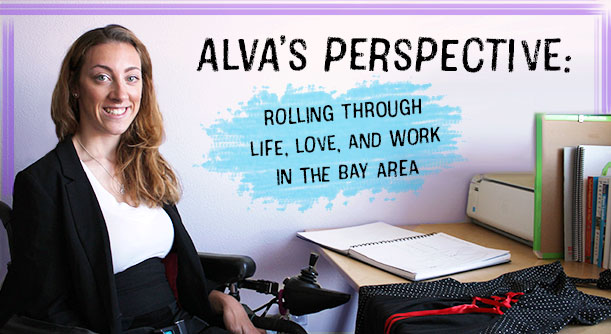“Ta-Ta for Now: A Farewell Post”
June 27th, 2014
by Alva
My goal in this blog was to write about personal experiences, challenges, and coping mechanisms, and hopefully provide some ideas and techniques that you can implement in your own lives or recommend to family members and loved ones. I hope that you, my readership, have been able to see similarities either in your own lives living with disabilities, or been able to share some of the knowledge you’ve learned with people you know who have disabilities. “Alva’s Perspective: Rolling Through Life, Love, and Work in the Bay Area” was a place for me to discuss some of the issues, challenges, and successes I have experienced in my life thus far. If you are just joining the “Alva’s Perspective” audience, and don’t have time to read through my previous posts, I have taken the time to write one final “summary post” compiling what I believe to be the highlights and take-away messages.
Resources:
As Hannah, my Independent Living Skills Specialist, takes down my dictation for this post, I would like to recap all of the wonderful programs and resources that provide assistance to people with disabilities in the Bay Area. Clausen House works with adults with developmental disabilities on independent living skills, integration into society and developing their social skills, and assisting them with life management. The assistance I receive from Clausen House is paid for by the Regional Center of the East Bay; a non-profit that provides services and support to people with developmental disabilities to ensure that each individual is living his or her life to its full potential. Although I do not work directly for nor receive services from the Center for Independent Living, they are a kind of one-stop-shop for gathering information about and assistance from local Bay Area disability organizations that help with many tenets of self-sufficiency when living with a disability.
Getting assistance through organizations is not the only way to make living with a disability work for you. Hiring personal attendants, that you manage and train, can help you live the day-to-day life that you want; having a cook that coordinates menus with you or ordering from GrubHub ensures that you eat what you want when you want it. The people at Safeway’s customer service desk are there to help you do your own grocery shopping, though you may still need assistance at home making a list and then unpacking groceries. Lastly, asking for accommodations in your apartment that help make it a comfortable and easy place for you to live, is something you are entitled to. More often than not, even if an apartment complex is not able to meet the accommodation directly, they are willing and able to find someone or some company that can fulfill it.
Problem-solving:
Problem-solving is a never-ending project. Solutions that you come up with which work in one setting, or at one living situation, might not work in another setting; be able to know yourself well enough to be able to modify basic solutions so that they are applicable to many different situations. A method that you create for coping with one transition might not work when dealing with a different transition; think of ways to create solutions to reoccurring problems that you can take with you from place to place and then slightly modify to better address specific contexts.
Despite the fact that I’ve been creating and modifying solutions and adaptations for years, the truth of the matter is that, even now, not all of said solutions come wrapped up with a nice bow. Sometimes I have to make sacrifices in order to reach the level of independence I am striving for. For example, when doing my grocery shopping, I have to decide whether it’s more important for me to go to the store by myself, then get assistance shopping, which may take two or more hours, or if I’m okay with asking an attendant to drive me and help get my groceries. Whether your goal is getting your nails buffed and polished, or traveling somewhere by yourself, develop systems that work for you and put you in control of your own life and actions.
Comfort with Disability:
When you are comfortable with your disability, those around you will be more comfortable with your disability. Whether you are on a date with someone who has never been out with someone with a disability, or engaging with a child who has never talked to someone in a wheelchair before, exuding confidence and comfort around your disability often speaks volumes more than the words coming out of your mouth. Whether this comfort is with your chosen method for getting around, the fact that your limbs spaz out when you get nervous, that you prefer eating chips and popcorn using your tongue over your hands, or showing a little kid how your chair lights up and makes beeping noises when you drive, one’s attitude about his or her disability is infectious. After an interaction with you, a kid who next sees someone in a chair rolling down the street or someone who keeps a more open mind in his or her dating life, the way that you choose to talk about and interact around your disability with others has a lasting effect.
Comfort with your disability goes beyond the social world. While the stakes might feel higher, and comfort with your disability might feel more necessary in a job interview, the same basic principles applies to both social interactions. Whether securing a second date or a second interview:find ways to mention disability early on and as naturally as possible, be aware of ways that your disability might create challenges, think creatively about ways to overcome these challenges, and take steps to ensure your physical comfort during an in-person interaction.
As I have said time and time again, regardless of the setting you are in, the activity you are participating in, or the people you are interacting with, the most important of “Alva’s Perspectives” is to think about what YOU want out of your life and how YOU feel comfortable getting it!



Leave a Comment